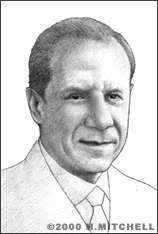Leonard Greene
Leonard Greene holds patents on dozens of inventions in aviation technology – most notably, a device that warns pilots when they are in danger of experiencing a deadly aerodynamic stall.
Born in New York City in 1918, Greene received his BS and MS degrees in civil engineering from the City University of New York. During World War II, Greene joined the Grumman Aircraft Corporation as an aerodynamicist and engineering test pilot. While working there, he was distressed to witness an aircraft accident caused by a stall. After some analysis, he realized that such a terrible event could occur if the pilot could not tell when the angle of airflow over a wing became excessive.
At the time, more than half of all aviation deaths were caused by the stall/spin. Greene set to work to create a stall-warning device that would help prevent such accidents. The result of his work brought him his first of more than 100 patents to date, 60 of which cover aviation technology. His Stall Warning Indicator received the Flight Safety Foundation’s first Air Safety Award and is found in all aircraft today. A Saturday Evening Post article published in 1947 said of Greene's innovation, “It may be the greatest life saver since invention of the parachute.”
In 1946, Greene established the Safe Flight Instrument Corporation in White Plains, New York, which manufactures and markets the stall warning system. Soon, Greene added more of his inventions to the product line, including a wind-shear warning system that warns a pilot if an aircraft enters a dangerous microburst and provides escape guidance.
Today, the firm supplies unique air safety and performance technology to virtually every major air carrier, the U.S. Armed Forces, and to aircraft manufacturers worldwide.
In addition to his achievements in the field of aviation safety, Greene’s innovations have also included devices designed to enhance performance of America’s Cup yachts, “visible speech” for the hearing impaired, a formula for linking color and sound, and bilingual film “sound titling.” He has also made his mark as a social activist, having designed a plan to transform the federal social budget to provide greater income security, middle class tax relief, and market incentives for productivity growth.
In 1974, Greene founded the Institute for Socioeconomic Studies in White Plains, a small policy research organization that helped to promote his ideas for welfare reform, healthcare reform, and foreign affairs. He wrote several books, including “Free Enterprise Without Poverty,” and a number of articles on socioeconomic issues. Greene also co-founded the Corporate Angel Network, which makes corporate planes available to transport cancer patients free of charge to and from distant hospitals. In 1977, he was awarded an honorary doctorate by Pace University.
He died on November 30, 2006 from lung cancer.


